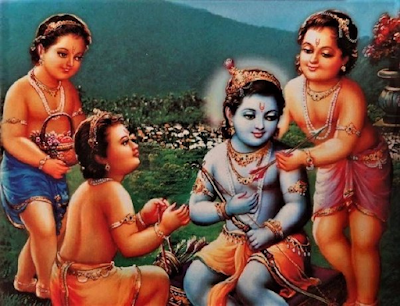More dangerous that either the Brahmaastra or the Pashupataastra, this Narayanaastra made the sky dark, and a strong wind ripped through the battlefield. Against the darkness, thousands of chakras, gadhas, arrows and other weapons appeared like lightning in the sky, ready to rain death on the Pandava side.
The Pandavas, as always, turned to their one and only refuge Krishna, for guidance.
He knew that astraa too well, for, didn’t it bear His name?
“All of you throw down all your weapons! Remove the tiniest thought of resisting the weapon from your minds! Fall to the ground in surrender to the weapon!” came His strange order.
Unresisting, all of the Pandava army immediately obeyed the order. And what a surprise! The weapons hovering in the sky began to slowly disappear.
But suddenly, there was a rain of arrows from the sky on the pandava Bhima.
Why?
Because he held his gadha (mace) high, unbending, challenging the might of the Narayanaastra.
As always, Krishna stepped in to save the situation.
He pulled Bhima to the ground and forced him to bow his head and fold his hands in prayer.
Immediately, the sky cleared, the sun shone bright again, and all the weapons from the sky disappeared.
Ashwatthama was stunned. The most powerful weapon in his arsenal had failed against the Pandavas!
What was the reason?
The Narayanaastra is the weapon of Lord Narayana. It is indeed the most powerful weapon in the world. Yet, there is something stronger than that, something that renders even the Lord powerless.
Sharanaagati. Surrender.
When we surrender to the Lord, He becomes powerless.
No longer is He able to look at our doshas (faults) and our papas (sins).
Karuna floods His heart, and He forgives all and accepts us unconditionally.
The gesture of prayer with hands folded in supplication is called “Anjali mudra”.
Immediately, the sky cleared, the sun shone bright again, and all the weapons from the sky disappeared.
Ashwatthama was stunned. The most powerful weapon in his arsenal had failed against the Pandavas!
What was the reason?
The Narayanaastra is the weapon of Lord Narayana. It is indeed the most powerful weapon in the world. Yet, there is something stronger than that, something that renders even the Lord powerless.
Sharanaagati. Surrender.
When we surrender to the Lord, He becomes powerless.
No longer is He able to look at our doshas (faults) and our papas (sins).
Karuna floods His heart, and He forgives all and accepts us unconditionally.
The gesture of prayer with hands folded in supplication is called “Anjali mudra”.

“Am jalayati iti anjalihi” – that which makes the Lord melt, is anjali.
Rishi Bharadwaja says
“Anjalihi parama mudra, kshipram deva prasaadini”
“The anjali is the best of all gestures and speedily secures on us the loving favour of the Lord”
Let us make it a practice to offer the anjali mudra to the Lord, and surely He will grace us with His blessings.
And perhaps with His grace, if we are able to surrender unresistingly when people of this world rain down the weapons of their angst on us, maybe our lives will also become easier!









